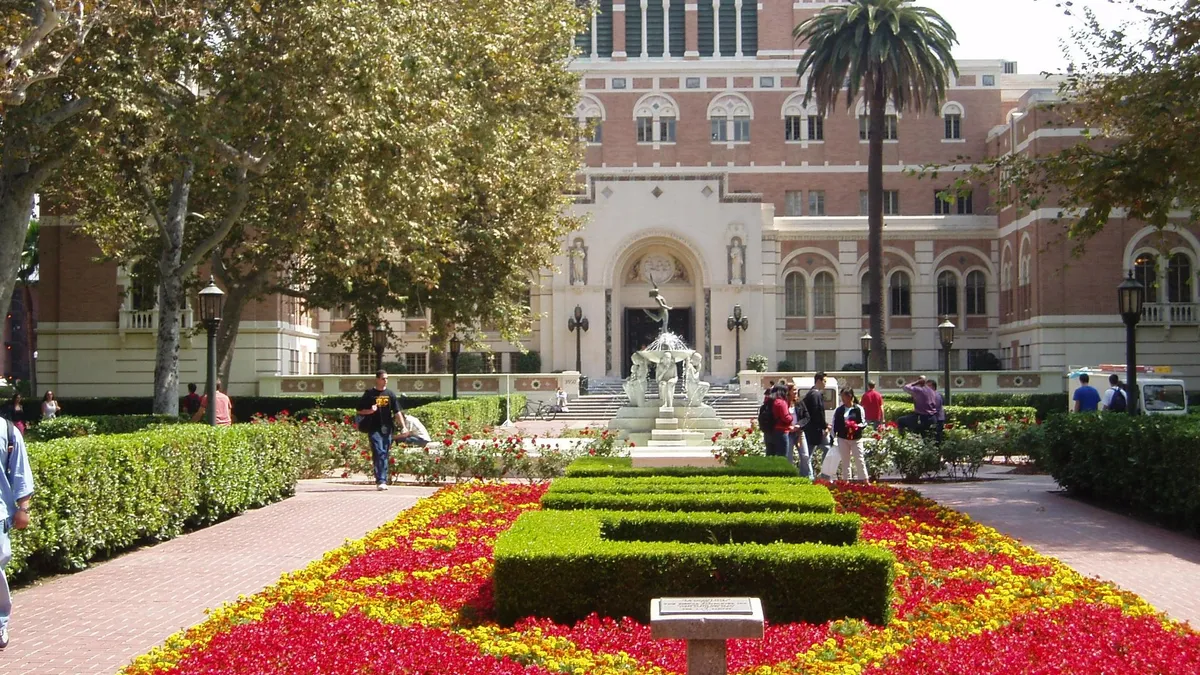Dive Brief:
- The news last week of an extensive admissions bribery scandal shed light on inequities and vulnerabilities in the processes colleges and universities use to review and admit some students.
- Among them, The Wall Street Journal reported, is the admissions pathway for recruited student athletes, the large workload of admissions officers that limits their oversight abilities, and the longstanding practice of admitting the children of donors.
- Colleges are being advised to address these areas, such as by raising scrutiny of recruited athletes, The Journal reported. Others argue that student-athletes and the children of donors should not be given preferential status.
Dive Insight:
Last week, 50 people were charged in an alleged nationwide conspiracy to game the college admissions system. Dozens of wealthy parents, including celebrities and CEOs, paid a California college prep firm millions combined to raise their children's standardized test scores and "to bribe coaches and university administrators" to list them as recruited athletes — significantly increasing their admissions prospects.
Since then, rejected applicants have sued the institutions involved over an allegedly unfair admissions process. The colleges have moved to cut ties with employees implicated, identify and redirect funds brought in through the scheme, and examine students and applicants who may have been involved. Political leaders have called for reviews to protect against further abuses. And the discussion over who gets in at elite institutions has been reignited.
The scandal's ringleader, the CEO of the prep firm, said his actions merely "created a side door" that would guarantee admission. In reality, however, he exploited several alternative pathways that are already in use and the subject of scrutiny.
Whether a prospective student's families are donors has long played a role in their admission to highly selective colleges and universities.
After all, those institutions rely on such donations, as indicated in a statement from the National Association of College and University Business Officers last week. The group noted that while it "shares in the public outrage" over the scandal, legislation announced in its aftermath to pull back tax benefits for donations to institutions before or during the enrollment of a family member "would inappropriately presume a lack of integrity in advancement, admissions, and compliance" at colleges and "threaten to curb charitable giving."
Those gifts, it argued, are "fundamental" to institutions' health and educational quality.
Also at issue in last week's scandal was the admissions pathway for recruited athletes. In an op-ed for The New York Times, columnist David Leonhardt argues that "a scam like this could exist only because competitive sports occupy a ridiculously large place in the admissions process."
Athletics recruitment was the subject of criticism long before the news broke. And research has proven out the issue at hand. In an interview with The Chronicle of Higher Education, Jerome Karabel, a professor and author of a book on the Ivy League admissions process, noted that "the weight of preference given to athletes far surpasses the weight given to underrepresented minorities or, for that matter, legacies." Leonhardt cites research that found recruited athletes get more of an advantage in admissions from their sports skills than non-athletes do for their extracurriculars.
That has equity and access implications, considering that the majority of athletes at elite institutions are white and many are from well-off families, The Atlantic reported. The publication goes on to say that while football and basketball players grab headlines and have higher representation of black athletes, "a phalanx of lower-profile sports" with high costs to participate tend to draw wealthy, white students. And getting recruited often requires committing to college early, sometimes before financial aid awards are announced, it notes. (Not all recruited athletes get scholarships.)
Spots on those lower-profile sports teams — for which it can be difficult for people beyond the coaches to tell whose abilities merit recruiting — were the focus of the admissions scandal.
Calls for change at elite institutions include reducing selectivity by enrolling more students, rethinking athletics recruitment, and limiting the tax benefits for some donations.
The admissions practices of elite universities were already in the spotlight, with Harvard and the University of North Carolina at Chapel Hill battling affirmative action lawsuits and the Justice Department pulling back support of race as a criteria in admissions.
Legal scholars are wary that removing the policy would take away institutions' autonomy to select their own classes and lead to further inequities at the types of colleges where — at least as the recent bribery scandal suggests — attendance is worth a very high price.














